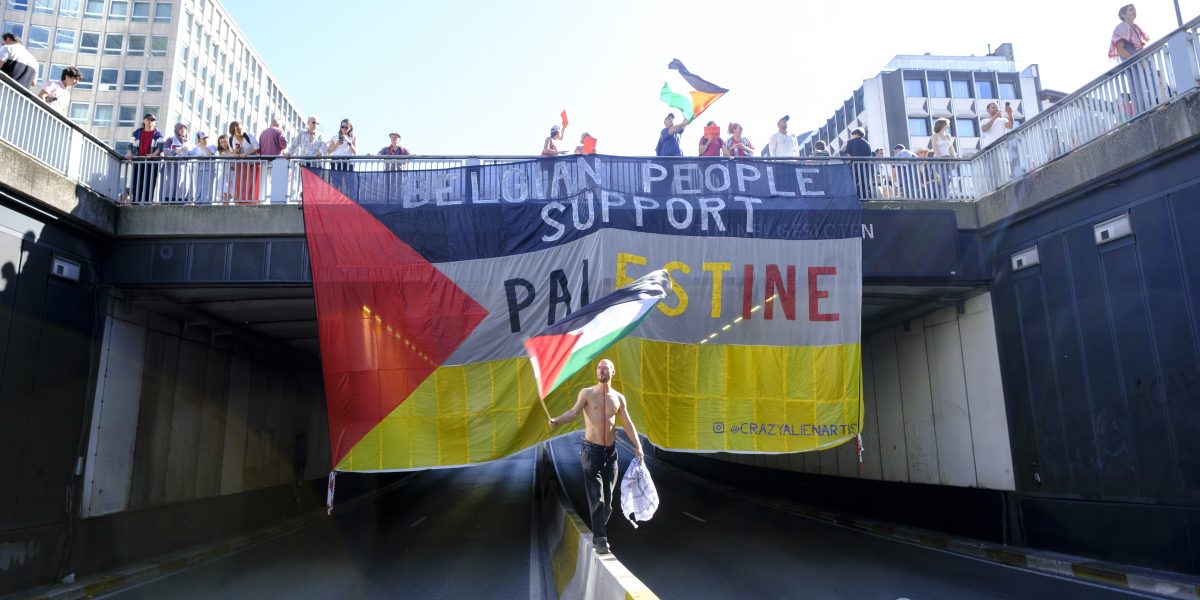Mahmoud Farajalah, a 26-year-old Palestinian living in Brussels, died after taking his life in a detention center near the Zaventem airport, sparking angry protests and a hunger strike among other detainees.
A prominent face on the daily Palestinian solidarity demonstrations outside the Bourse, a major city square, Farajalah was arrested three months ago after one such protest and placed in immigration detention, according to activists.
“He was such an incredible person, the kindest and the most thoughtful person who I ever met in that center.”
Farajalah’s mother had recently died in Gaza, but he had been denied permission to leave the detention facility to mourn her, according four sources with knowledge of the situation, including Anas Hamam, a Moroccan detainee who had met Farajalah in the “127 Bis” detention center but was transferred to another facility a month ago.
How Farajalah’s mother passed remains unclear.
Hamam told The Intercept by phone, “He was such an incredible person, the kindest and the most thoughtful person who I ever met in that center.”
Around eight Palestinians are thought to have been held in Belgium’s detention camps, according to activists. Many were arrested by plainclothes police officers after Bourse demonstrations.
Last week, Amnesty International called for an investigation into Belgium’s harsh crackdowns on the protesters. Riot police had used tear gas and water cannons on demonstrators in Brussels against Israel’s interdiction of an aid flotilla to Gaza last week.
Belgium’s migration and asylum service confirmed Farajalah’s death, but spokesperson Dominique Ernould declined any further comment citing confidentiality and the privacy of the family.
“The situation is calm in the center,” Ernould said. “The necessary support is being provided to the center’s residents and staff members.”

Asylum Denied
Two sources, including Hamam and a pro-Palestine activist who asked to remain anonymous for fear of retaliation, said that Farajalah had recently had an asylum claim turned down.
“He didn’t have papers,” the activist said. “Belgium denied him access to international protection.”
As word of Farajalah’s death spread, Palestine solidarity organizers called for a protest of “fire, rage, noise” outside the detention center on Saturday.
“He had lost his mother,” organizers wrote on an Instagram post. “He had asked to be released so he could mourn. He had written. He had pleaded. The administration ignored him. The system crushed him. Silence killed him.”
We’re independent of corporate interests — and powered by members. Join us.
Join Our Newsletter
Thank You For Joining!
Original reporting. Fearless journalism. Delivered to you.
Will you take the next step to support our independent journalism by becoming a member of The Intercept?
By signing up, I agree to receive emails from The Intercept and to the Privacy Policy and Terms of Use.
A group calling itself “Getting the Voice Out” sent The Intercept a statement saying that other detainees in the facility were outraged by the death.
“They are starting a hunger strike at the center and have made a flag with his name on it,” the statement said. “They tell us, ‘Today it’s Mahmoud, tomorrow it’s someone else. Security is laughing at us. We have to do something.’”
Activists and a former detainee at “127 Bis” said people held there were routinely denied phone calls and internet access, among other charges.
Ernould, the migration authority spokesperson, denied claims by activists and Palestinian detainees — one of whom has talked to The Intercept — of mistreatment in the detention camps.
“Residents in closed centers are not mistreated,” she said. “They receive all the necessary care: medical and psychological. Residents have the option of receiving phone calls or making phone calls to their loved ones and families outside the facility.”
The National Suicide Prevention Lifeline offers 24-hour support for those experiencing difficulties or those close to them, by chat or by telephone at 988.
